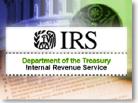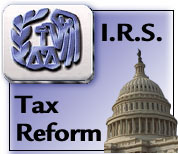|
A kinder, gentler IRS?
|
 |
March 7, 1999: 6:36 p.m. ET
New reforms benefit the consumer, but experts say it's only the beginning
|
NEW YORK (CNNfn) - Gone are the days of the heartless, dour-faced, tax-grubbing IRS agent.
Thanks to the IRS Restructuring and Reform Act of 1998, which mandates the rights and needs of taxpayers be made top priority, the IRS is on a new mission this tax season: to collect only those taxes that are owed and to do so fairly, respectfully and efficiently.
"'Go out and run 'em through the mill -- and if they don't have the records, assess it, assess it, assess it.' That's been our IRS for the past 50 years," said Bryan Gates, chairman of the government relations committee of the National Association of Enrolled Agents -- tax specialists who, among other things, represent taxpayers in disputes with the IRS.
But, Gates said, the new legislation forces the IRS to acknowledge "the American public want to pay what they owe and there's no need to beat them about the head."

Greater legal protection for you
The law, enacted last July, offers taxpayers greater protection in several areas, notably audits, certain situations involving spousal liability, and cases involving seizure of property -- for the first time you can appeal an IRS seizure order before your property is confiscated.
The law also bars the IRS from charging penalties and interest if the agency waits more than 18 months to tell you that you owe additional taxes. And it allows for greater flexibility in repayment plans for those who owe $10,000 or less in back taxes, excluding interest and penalties.
Congress also expanded the role and independence of the National Taxpayer Advocate, whose office is charged with representing the taxpayer's point of view within the IRS. The advocate is now freer to grant relief to taxpayers in cases of undue hardship.
Shifting the burden of proof
The Restructuring Act has led to a "sea change in spirit" at the IRS, empowering the agency to "act reasonably," said David Lifson, chairman of the tax executive committee of the American Institute of Certified Public Accountants.
Take the much dreaded audit. While the legislation does not necessarily reduce your chances of being audited, it has altered the nature of certain types of audits permitted, as well as the attitudes of collection agents conducting them.
"Some (IRS) agents historically took the view that they never met a taxpayer who didn't cheat," Lifson said.
It was those agents, among others, who abused the IRS's right to use a method called the "financial status audit" to determine cases of unreported income, he said.
In recent years, the technique, normally reserved for criminal investigations, began to be used on ordinary taxpayers if their returns were "at all deficient in records," Gates said. But often the IRS had no hard evidence of any wrongdoing.
Among those most likely to be targeted were those who work in high-cash businesses or people who own their own companies, said Pete Sepp, vice president of communications at the National Taxpayers Union.
Once suspected of failing to report income, a taxpayer could be subjected to an intimidating investigation in which he would have to itemize and justify all assets and expenses over however many years the IRS deemed necessary.
The financial status audit method, "a legitimate tool in the hands of legitimate agents … became an oppressive tool in the hands of the wrong agents," Lifson said.
The Reform Act shifted the burden of proof from the taxpayer to the IRS, mandating that the agency must now show in advance a "reasonable indication that there is a likelihood of unreported income" before proceeding with a financial status examination.
Greater accountability, accessibility
To adequately address taxpayers' needs, the Restructuring Act also focuses on the need for change in IRS culture.
In a speech to the Senate last summer, Finance Committee Chairman William V. Roth Jr. said the reports shown to Congress detailing IRS abuses show "a full 74 percent of group manager evaluations … cited dollars per hour, hours per return, and dollars recommended for collection" by an employee and these so-called "enforcement statistics" were a key factor in one's advancement.
The Reform Act mandates that the IRS now place "more emphasis on quality of service" instead of simply how much tax an agent assesses or how many cases she closes, said Sepp of the National Taxpayers Union. Now, he said, the IRS looks at "how many people did an agent help (and) how many cases did she resolve without it having to go to court."
Greater accessibility to IRS employees and courtesy are other goals. In addition to listing its toll-free number, the IRS is now required to list its local branch numbers in the phone book. And you can expect to hear an IRS employee's name, phone number and work ID number if the agency initiates contact with you, said P. Gerard Sokolski, vice president of chapter operations for the New York State Society of CPAs.
Good start, long way to go
CPAs, taxpayer representatives and taxpayers themselves agree the IRS is on the right track, but there is much left to do to reconcile the "good intentions" of Congress with the realities of the agency.
"Everybody was extremely polite, but completely uninformed," said small business owner Todd Wiener, who decided to prepare his company's taxes without an accountant and called the IRS several times for advice on various forms and tax changes.
Likewise, members of the National Taxpayers Union have applauded the increased access to agents and taxpayer advocates, but told Sepp the "quality of advice hasn't improved a great deal."
Sepp attributes this to the fact that the tax code is still very complex and open to interpretation. He sees improvement in the years to come, though, because the Reform Act calls for regular internal reviews of the tax code and a simplification of new tax laws.
That's good news for accountants and taxpayers alike, Lifson said. He looks forward to the day he can explain a change in the tax code without his client's eyes glazing over. 
-- by staff writer Jeanne Sahadi
|
|
|
|
|
 |

|

